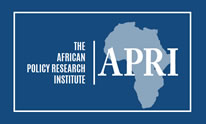The African Policy Research Institute has three major programme components:
- Research.
- Communication and outreach.
- Capacity building and Technical assistance.
A. RESEARCH
The research programme will focus on four thematic areas;- Environment and climate change
- Public finance and institutions
- Trade and investment.
- The social sector.
1. Environment and Climate Change
Challenges such as climate change; pollution, land degradation and biodiversity loss can be attributed to market failures, which are present in almost all sectors of SSA economies. The true costs of environmental and social externalities should be factored in development processes in order to ensure positive sustainable outcomes. This programme seeks to provide analytical information on ecosystems and ecosystem services essential for production, economic growth and poverty alleviation within a nexus of different governance regimes that ensure sustainable development.
2. Governance and Public Finance
The citizenry and business community in most African countries are demanding more efficiency, greater accountability and better quality of public service. They have becomes more critical concerning their respective government’s expenditure, taxation and deficit policies, and policy outcomes. There is also increasing financial pressure for governments to do business in a cost-effective manner, become more accountable and deliver high quality public services. This programme seeks to undertake policy research and provide technical assistance to African governments and civil society organizations in the public expenditure management cycle.
APRI, through it governance and public finance programme, has an in-depth understanding of the strengths and weaknesses of macro-fiscal and public finance systems particularly in SSA and therefore seeks to work with governments in collaboration with other civil society organizations and public policy think-tanks in order to provide unique solutions in the areas of Budget cycle formulation and medium term expenditure framework (MTEF), budget execution performance budgeting, strengthening decentralized units financial management and macroeconomic studies and evaluations.
3. Trade, Investment and Development
Most SSA countries have trade and investment as a key strategy for effective economic development. They are engaged simultaneously in a number of trade regulations processes that cover a wide variety of issues and countries. In this regard, most countries are trying to strike a balance between their rights and obligations. The aim of this programme is to contribute to the development and implementation of trade regimes and economic relations that integrates key factors and players in SSA economies.
Besides the bilateral negotiations, most SSA countries are involved in: multilateral negotiations, that involve the majority of countries worldwide in the context of the WTO; regional trading blocs, those that involve different country groupings such as the European Union (EU), Common Markets for Eastern and Southern Africa (COMESA) and the East African Community (EAC) and the new African Continental Free Trade Areas (AfCFTA) among others. The Trade and Investment Programme, through analytical research, forums and encounters with law and policy makers raises key concerns that need to be addressed by the global community.
4. Social Sector
- Poverty and inequality- the objective is to establish the poverty trends and dynamics, falling in and out of poverty and their contribution to overall poverty. The dynamics of inequality also affect the distribution of dividends of economic growth.
- Education is a key component of an individual’s quality of life and a nation’s overall development outcomes. This theme seeks to establish the relationship between education inputs, outputs and outcomes.
- Health sector is managed in either as a central government function or devolved function at the sub-national level in most SSA countries. Under health, the focus is on health policy financing, service delivery and health outcomes.
- Labour Market: The sector focuses on labour policies and practices that enhance or impinge employment creation and the quality of employment.
- Social Protection: focuses on the range of policies and programmes needed to reduce the lifelong consequences of poverty and exclusion.
B. POLICY COMMUNICATION AND OUTREACH
The research output is used for communication and outreach and particularly targeting key stakeholders who influence policy processes as well as policy implementers.
C. CAPACITY BUILDING AND TECHNICAL ASSISTANCE
This will focus on capacity building and technical assistance to various stakeholders on issues relating to the APRI thematic research focus areas as deemed necessary.
